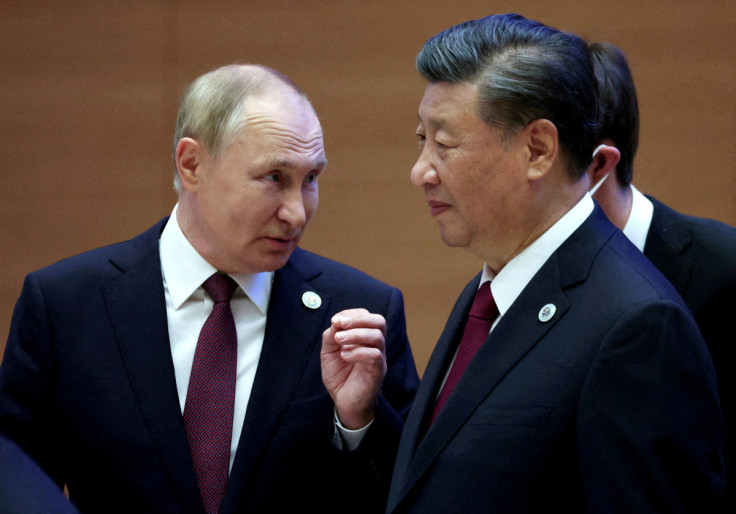Xi Jinping to meet Vladimir Putin first time on Monday after Russia's invasion of Ukraine
The visit will be viewed as a strong demonstration of Beijing's support for Moscow to Ukraine's Western allies

Next week, Chinese President Xi Jinping will travel to Moscow to meet with Russian President Vladimir Putin. This will be Xi's first trip to Russia following Putin's deadly invasion of Ukraine more than a year ago.
The visit will be viewed as a strong demonstration of Beijing's support for Moscow to Ukraine's Western allies, whose leaders have grown weary of the two countries' growing alliance as the war rages.
It will also be Xi's first travel outside of China since he was elected to an unprecedented third term as leader last week during the annual session of China's legislature.
Besides, this visit comes just three days after the International Criminal Court (ICC) based in the Hague announced arrest warrant for Putin over his Ukraine invasion.
Beijing and the Kremlin both released statements on Friday announcing the meeting.
The visit, according to China's Foreign Ministry, will take place from Monday through Wednesday at the invitation of Putin and confirmed that the war in Ukraine would be a core part of the talks. "China's proposition boils down to one sentence, which is to urge peace and promote talks," foreign ministry spokesman Wang Wenbin said.
Xi and Putin to discuss 'topical issues'
The two leaders will discuss "topical issues of further development of comprehensive partnership relations and strategic cooperation between Russia and China," the Kremlin said.
"An exchange of views is also planned in the context of deepening Russia-Chinese cooperation in the international arena," the Kremlin added. "A number of important bilateral documents will be signed."
Russia and China's meeting schedule
The schedule of Xi and Putin's meetings was also made public by the Kremlin. According to Dmitry Peskov, a spokesman for the Kremlin, the two presidents will meet one-on-one on Monday, followed by an "informal lunch" before negotiations begin on Tuesday.
Putin and Xi will sign documents attesting to stronger ties between the two countries, according to Yuri Ushakov, the Russian president's adviser on foreign relations. They also intend to talk about the conflict in Ukraine.
"Moscow highly appreciates the balanced position of the Chinese leadership," Ushakov told Russian state media outlet TASS.
"Russia and China are satisfied with the highest level of relations that continue to develop, Xi Jinping's visit to Moscow will give them a new impetus," he added.
China positions itself as an 'impartial peacemaker'
The trip coincides with China's efforts to position itself as an impartial peacemaker in the Ukraine conflict, including the recent issuance of a position paper pushing for a political resolution.
During my call with China's State Councilor and Foreign Minister Qin Gang today, we discussed the significance of the principle of territorial integrity. I underscored the importance of @ZelenskyyUa’s Peace Formula for ending the aggression and restoring just peace in Ukraine.
— Dmytro Kuleba (@DmytroKuleba) March 16, 2023
Calling for negotiations, China's new foreign minister Qin Gang called his Ukrainian counterpart Dmytro Kuleba on Thursday. The two talked on "the importance of the idea of territorial integrity," according to Kuleba's tweet.
However, Western leaders have expressed doubts about the mediation claim, citing China's failure to recognise the nature of the conflict and strengthening connections with Russia.
Since the invasion, Xi has spoken to Putin numerous times, both in person and over the phone, but he has not made a single phone call to the president of Ukraine.
Xi and Putin established a "no-limits" friendship in February last year, when the Russian leader visited Beijing for the opening ceremony of the Winter Olympics.
And under Xi, China has declined to criticise or even mention Russia's invasion, blaming NATO for inciting the crisis and reinforcing Kremlin propaganda.
Additionally, it has supported Moscow diplomatically and improved economic and military ties by increasing trade and staging regular joint military drills.
Western leaders have recently started publicly voicing their worries that China may be considering offering Russia deadly military support, a charge Beijing has refuted.
Russia and China's friendship
Earlier this month, only a few days before the anniversary of the Kremlin's invasion of Ukraine, Putin received Wang Yi, China's senior diplomat, in Moscow.
In response, Wang pledged to "further strengthen our comprehensive strategic collaboration." Putin informed Wang that relations between his nation and China had "reached new milestones."
The two leaders last conversed virtually in December, during which Putin hailed bilateral ties as "the finest in history" and asserted that they could "withstand all testing."
The U.S., which they feel is determined to keep China and Russia in check, is viewed with intense distrust and hostility by the two leaders. A new world order that better serves the interests of their own countries and is not controlled by the United States is also something they both share.
They have also forged a close personal connection, with Xi describing Putin as a "best friend" in 2019. Since becoming China's president, Xi has personally met Putin 39 times. Their most recent encounter took place in September during a meeting in Central Asia.
Washington to monitor Russia and China's meeting
During the conference next week, U.S. officials say they will be closely observing for indications that China is pushing forward with providing weaponry to Russia.
According to authorities, there hasn't been any concrete evidence that Beijing will provide lethal support for Moscow's military efforts, but the conference next week could be the setting for such a statement.
This week, national security advisor Jake Sullivan said, "It's something we will watch for. Obviously, Russia has its own interests in trying to pull other countries into this conflict if it can, but our position is the same whether or not they meet," he added in the statement.
Not that Chinese weapons would enable Moscow to secure a resounding victory in Ukraine however, it is the cause for concern among U.S. officials. The major concern being that Beijing's potentially lethal assistance may extend the fight, which U.S. feel benefits Putin.
If U.S. resources and attention are diverted to Ukraine rather than Asia, where Beijing has stepped up its military assertiveness, a protracted conflict may also be advantageous for China.
© Copyright IBTimes 2025. All rights reserved.




















